初中英语 英美文化 中英美文化常识素材
英美文化Unit3(学习资料)

英美文化教程Unit 3Chapter 3. Which English?I . Focal Pointsthe roots of the English languageOld EnglishMiddle Englishdifferences between Old English and Middle Englishdifferences between Middle English and Modern EnglishModern EnglishShakespeare' s EnglishBBC EnglishStandard Englishchanges in the English languageThe King' s English and the advice given in the bookII. Questions and Answers on the T ext1. Why did the Celtic people leave little that could later be incorporated into English?They left little that could later be incorporated into English because these people had no written language.2.Where can we find relics of Celtic?We can find relics of Celtic in place names.3.What are the Celtic languages that survive in Britain today?The Celtic languages that survive today are Welsh, Scottish Gaelic and Irish Gaelic.4 What is meant by lingua franca? Give one example of lingua franca ever used in British history.Lingua franca is any language widely used as a means of communication among speakers of other languages. One example is Latin, which became the lingua franca of Britain after the Romans, invaded Britain in 55 BC.5.When did the English alphabet appear? What scripts was it adapted from?The English alphabet appeared sometime between AD 500 and 700. It was adapted from Roman scripts.6. When did the history of the English language really begin? What happened then? The history of English really began around AD 450 when the Angles, Saxons and Jutes - tribes from north-west Germany and Denmark-invaded England in succession.7. How did the four dialects of Old English emerge?After the Germanic tribes of Angles, Saxons and Jutes had taken control of Britain and settled, the four main dialects of Old English emerged from the Germanic dialects.8. What is the ancestor of the modern English language?The ancestor of the modern English language is Old English of Anglo-Saxon.9. What scripts did writers of the Old English period use?Writers of the Old English period used both Latin and Germanic scripts.10. How did the Scandinavian influence enter Old English?The Scandinavian influence entered Old English by way of the Vikings from Scandinavia.11. How large was the vocabulary of Old English by the end of its period?By the end of its period, Old English contained a vocabulary of 30,000 words.12. Name one best-known Old English writer and his works.One of the best-known Old English writers was the V enerable Bede (673--735). His Ecclesiastical History of the English People is one of the main sources of information about the history of Anglo-Saxon English.13. What became the official language of England after the Norman invasion led by William the Conqueror? What language did the common people speak?After the Norman invasion led by William the Conqueror, Norman French became the official language of England. The common people, however, continued to speak their Anglo-Saxon language.14. In English, why do many words connected with administration come from Norman French?Many English words connected with administration come from French because after the Norman invasion Norman French became the official language of England, and the most important positions were given to Normans, who organized government and public affairs.15. What is known as Middle English?The blend of Anglo-Saxon, Latin and French which developed in the three centuries after the Norman Conquest is known as Middle English.16. When did Middle English begin?Middle English began in 1066.17. Why did the literature of England become trilingual in the three centuries following 1066?The literature of England became trilingual because the literature was written in Middle English, which is a blend of French, English and Latin.18. In Middle English, what is meant by the Romance words, and what is meant by the Germanic words?Romance words were the Latin and French words; Germanic words were the English and Scandinavian words.19. Who was the most important writer who used Middle English?The most important writer who used Middle English was Geoffrey Chaucer.20. What is the basic difference between Old English and Middle English?The difference between Old English and Middle English lies mainly in the abandonment of the system of grammatical inflexions.21. In what aspects did the changes from Middle English to Modern English take place?The changes from Middle English to Modern English involve mainly pronunciation, vocabulary and spelling.22. When did the spellings and written forms of English begin to become standardized?The spellings and written forms of English began to become standardized at the end of the fifteenth century, with the invention of the printing press (1476).23. When did Modern English start?Modern English started from about AD 1500.24. What does BBC stand for? When was it founded? What was its motto?BBC stands for the British Broadcasting Corporation. It was founded in 1927. Its motto was Nation Shall Speak Peace Unto Nation. It meant that the English in which the voice of peace was broadcast over the radio should be universally understood.25. Whose particular style of speech is usually recognized as Standard English or Received Pronunciation English?The Particular style of speech of the BBC announcers is usually recognized as Standard English or RP English.26. Whom do the speech patterns of the BBC announcers represent?The speech patterns of the BBC announcers represent the educated southern upper class.27. Why has the English language had a very strong association with class and social status?This began from the Norman times when the upper classes spoke a completely different language from the common people.28. What difference have modern ideas of social equality made to language use in Britain?With the ideas of social equality, hallmarks of class distinction such as styles of speech have been gradually discarded, especially by the younger generation.29. What was the attitude towards language use in Britain by the second half of the 1960s? What was the characteristic of the fashionable speech of the day?By the second half of the 1960s, it became apparent that it was not necessary to speak Standard English or even correct grammar to become popular, successful and rich. The fashionable speech of the day was no longer the prerogative of a privileged class rather a defiant expression of classlessness.30. What is the greatest single influence of the shaping of the English language in modern times?The greatest single influence of the shaping of the English language in modern times is the American accents, idioms and vocabulary exported all over the globe by US films.31. What was the characteristic of the fashion of speech in the 1970’s in Britain?In the 1970s, fashion favoured careless enunciation and a language full of jargon, slang and "in" words, much of it quite incomprehensible to the outside world.32. Who were the authors of The King' s English?The authors of The King' s English were the Fowler brothers.33. What is the approximate proportion of Germanic vocabulary and Romance vocabulary in current English vocabulary?Current English V ocabulary is approximately half Germanic (English and Scandinavian) and half Romance (Latin and French).IV. Explanations:1. Old English(1) Also called Anglo-Saxon, it is the first period of the English language from the time of the Anglo-Saxon invasion of Britain in AD450 to the Norman Conquest in 1066.(2) Old English used both Latin and Germanic scripts. (3) Old English is the ancestor of Modern English. It is quite different from today's English.2. the V enerable Bede(1) The V enerable Bede (673--735) was one of the best. known Old English scholar-monks. (2) He wrote the Ecclesiastical History of the English People, which is one of the main sources of information about the history of Anglo-Saxon England.3. Middle English(1) Middle English is the name given to the English language in use from the Norman Conquest of 1066 to the introduction of the printing press in England in 1476. (2) Middle English is the blend of Anglo-Saxon, Latin and French. (3) The difference between Old English and Middle English lies mainly in the abandonment of the system of grammatical inflexions.4. Geoffrey Chaucer(1) Geoffrey Chaucer (1345--1400) was the most important Middle English poet. (2) His masterpiece was The Canterbury Tales.5. Modern English(1) Modern English is the English language since 1476. (2) With the introduction of the printing press in 1476, spellings and written forms of the English language began to become standardized. (3) The changes from Middle English to Modern English involve mainly pronunciation, vocabulary and spelling.6. the BBC(1) It stands for the British Broadcasting Corporation. (2) Its motto is Nation Shall Speak Peace Unto Nation. (3) The motto means that the voice of peace spoken over the radio should be universally understood. (4) The speech patterns of BBC annoumers represent the educated southern upper class, and their particular style of speech is recognized as Standard English or Received Pronunciation (RP) English.7. Standard English(1) The form of English as written and spoken by educated speakers of the language. (2) The style of speech of BBC announcers is usually recognized as Standard English. (3) Standard English is also the most appropriate variety of English for a foreigner learning English to copy.8. The King' s English(1) The famous book written by the Fowler brothers in 1906. (2) The best advice to all those who wish to become proficient in English was given in this book. (3) The best advice is to try to be direct, simple, brief, vigorous and lucid. (4)This general principle may be translated into practical rules in the domain of vocabulary as follows: Prefer the familiar words to the far-fetched.Prefer the concrete word to the abstract.Prefer the single word to the circumlocation.Prefer the short word to the long.Prefer the Saxon word to the Romance.。
英美文化基础(部分)

Men first came to Britain Cave man
Great Britain was joined to the European continent.
Ice Age
6,000-5,000 BC, landbridge severed
Early settlement
�� 450
�� 690
Three Germanic tribes(Angles, Saxons, Jutes) were invited to defend England from attacks of Picts and Scots. They are farmers and fishermen, soldiers and sailors, combining all the qualities to develop and defend a land. They speak Old English (Anglo-Saxon). They defeated the Celts (King Arthur), who escaped to mountainous Wales and Scotland and even across to Ireland. Egbert, king of Wessex, united England, titled him ��King of the English��. Peace were established by marriage alliances. In 886, Alfred, King of Wessex became lord of all the English.
Lowland Britons(settled agriculture life) accepted and appreciated the Roman way of life. Picts in Pennines (����ɽ��) and Scots in highlands(nomadic life) revolted against Romans. Resistance in Wales were stamped out. Hadrian��s Wall(����������) The downfall of Roman empire in Britain, a leaderless and defenseless land, northern tribes began to come in
初中英语英美文化中英美文化常识素材
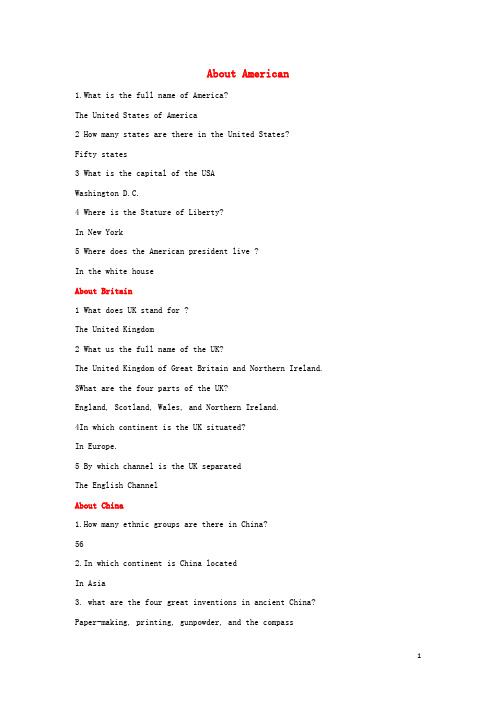
About American1.What is the full name of America?The United States of America2 How many states are there in the United States?Fifty states3 What is the capital of the USAWashington D.C.4 Where is the Stature of Liberty?In New York5 Where does the American president live ?In the white houseAbout Britain1 What does UK stand for ?The United Kingdom2 What us the full name of the UK?The United Kingdom of Great Britain and Northern Ireland. 3What are the four parts of the UK?England, Scotland, Wales, and Northern Ireland.4In which continent is the UK situated?In Europe.5 By which channel is the UK separatedThe English ChannelAbout China1.How many ethnic groups are there in China?562.In which continent is China locatedIn Asia3. what are the four great inventions in ancient China? Paper-making, printing, gunpowder, and the compass4. What is the largest island in China?Taiwan Island5. When was the people’s Republic of China founded?On October 1st,19496. How many stars are there on the national flag of China?Five7 .Name three neighboring countries of China(The answer varies. It could be any three of them) Japan, Vietnam, Russia, Cambodia, Laos, etc) three well -known scenic spots in Beijing(The answer varies. It could be any three of them) The Great Wall, the Summer Palace, the Imperial Palace, Tian’anmen Square, etc.9 .Why do the Chinese people usually eat at the Mid-Autumn FestivalThey celebrate the it to honor the great poet Qu Yuan10. what do Chinese people usually eat at the Mid-Autumn Festival.Moon cakes.11.What is the most important traditional festival in China?The spring Festival12. what do the Chinese do on New Year’s Eve?Family members get together and have a big dinner.13. what do people eat on the Lantern Festival?Rice dumplings14. What animal is called “The National Treasure of China”?The panda.。
英美文化小常识
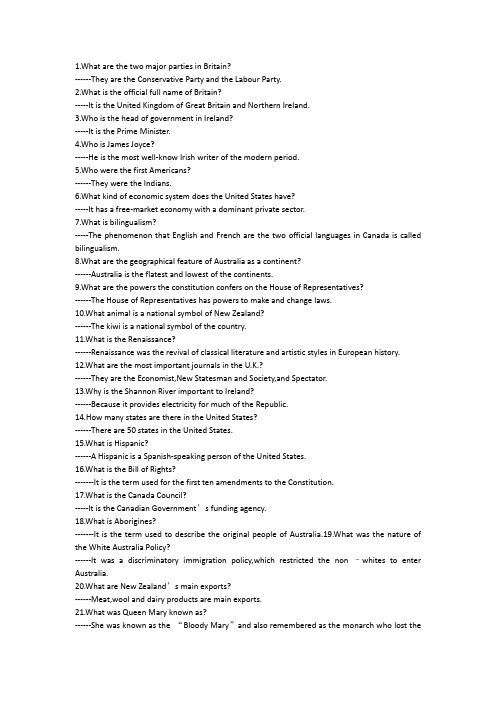
1.What are the two major parties in Britain?------They are the Conservative Party and the Labour Party.2.What is the official full name of Britain?-----It is the United Kingdom of Great Britain and Northern Ireland.3.Who is the head of government in Ireland?-----It is the Prime Minister.4.Who is James Joyce?-----He is the most well-know Irish writer of the modern period.5.Who were the first Americans?------They were the Indians.6.What kind of economic system does the United States have?-----It has a free-market economy with a dominant private sector.7.What is bilingualism?-----The phenomenon that English and French are the two official languages in Canada is called bilingualism.8.What are the geographical feature of Australia as a continent?------Australia is the flatest and lowest of the continents.9.What are the powers the constitution confers on the House of Representatives?------The House of Representatives has powers to make and change laws.10.What animal is a national symbol of New Zealand?------The kiwi is a national symbol of the country.11.What is the Renaissance?------Renaissance was the revival of classical literature and artistic styles in European history. 12.What are the most important journals in the U.K.?------They are the Economist,New Statesman and Society,and Spectator.13.Why is the Shannon River important to Ireland?------Because it provides electricity for much of the Republic.14.How many states are there in the United States?------There are 50 states in the United States.15.What is Hispanic?------A Hispanic is a Spanish-speaking person of the United States.16.What is the Bill of Rights?-------It is the term used for the first ten amendments to the Constitution.17.What is the Canada Council?-----It is the Canadian Government’s funding agency.18.What is Aborigines?-------It is the term used to describe the original people of Australia.19.What was the nature of the White Australia Policy?------It was a discriminatory immigration policy,which restricted the non –whites to enter Australia.20.What are New Zealand’s main exports?------Meat,wool and dairy products are main exports.21.What was Queen Mary known as?------She was known as the “Bloody Mary”and also remembered as the monarch who lost thelast British possession on the continent------French port of calais.22.What did Britain become after the Industrial Revolution?-----Britain became the “workshop of the world”.23.What is the House of Lords made up of?------It is made up of the Lords Spiritual and the Lords Temporal.24.What are the two major parties in Ireland?------They are Fianna Fail and Fine Gael.25.What is meant by “Vietnamization”of the war?--------It meant that South Vietnamese troops would be war-built up to replace Americal fighting force.26.Which country is the world’s biggest producer and user of tobacco?------It is the U.S.A..27.Who was the only writer in colonial period still read today?-------He was Benjamin Franklin.28.Who was the first prime minister in Canada?------He was Sir John Macdonald.29.What was the convict system?------In the convict system, the convicts were punished by being transported to remote places. 30.How is New Zealand electricity produced?------It is produced by: firstly,hydropower;secondly,gas;thirdly,coal.31.What is the most important established Church in Britain?-----It is the Church of England.32.What is the jury’s job in Britain?------In criminal cases,it is to decide the issue of guilt or innocence.33.Where were oil and natural gas found in Britain?------Oil and natural gas are found under the North Sea.34.What are the characteristics of Ireland’s climate?-----It can be described as “mild,moist and changeable”.35.What did the real Americal Literature begin?-----It began after the America War of Independence.36.Where is the president of the United States’offcial residence?-----The White House is his official residence.37.What kind of history do people often say that the history of Canada?------People often say that the history of Canada is a history of immigration.38.What is “urban sprawl’’?------It refers to a city that has grown over a large area of land.39.What is the way of changing the constitution in Australia?------The Constitution can be changed only by referendum.40.Where is the volcanic activity in New Zealand?------The volcanic activity can be found on the central plateau in North Island.41.What are the three natural zones in Scotland?------They are the Highlands in the north,the central Lowlands and the southern Uplands.42.What was the Gunpowder plot of 1605?------It was the most famous of the Catholic conspiracies.43.What did the English Industrial Revolution begin with?-----It began with the textile industry.44.What is the capital of Ireland?------It is Dublin.45.Which state is the largest in the United States?------Alaska is the largest one.46.What is the American foreign policy in the early 1930s?-----In the early 1930s,the American foreign policy was isolationist.47.What is affirmative action?------It is the preferential treatment for minorities and women in education and employment. 48.What was established in 1670 in Canada?------The English Hudson Bay Company was established in 1670.49.Which hemisphere is Australia in?------It is in the Southern hemisphere.50.Where is the capital of New Zealand?------It is Wellington.51.Who were the Vikings?-----The Vikings were the Norwegians and the Danes from Denmark.52.Which system was completely established under William in English?-----The feudal system was completely established under William in English.53.What are the main courts of civil jurisdiction in England and Wales?-----They are the Country Courts.54.When did Ireland declare itself a republic?------Ireland declared itself a republic on April 18,1949.55.Where is known as the agricultural capital of the U.s.?-----Omaha is known as the argricultural capital of the U.S.A..56.What is the most central functions of the Congress in America?-----It is the passage of laws.57.What is Mark Twain’s master work?-----It is the Adventure of Huckleberry Finn.58.Which city is Canada’s largest city?-----It is Toronto.59.What was Australia called in the 1950s?------Australia was called “the lucky country”in the 1950s.60.What do you think is the most noticeable feature of New Zealand geography?-----It is mountains widely spread all over the country where active volcanoes scatter.61.Which war was relatively smooth,with no bloodshed,nor any execution of the king in Britain? ------It is the Glorious Revolution.62.What are the three periods as far as the evolution of the British economy is concerned?-------There are steady development in the 50s and 60s,economic recession in the 70s and economic recovery in the 80s.63.What is a constitutional monarchy?------It is a governmental system in which the head of State is a king or a queen who reigns butdoes not rule.64.What is the chief language of instruction in Ireland?-----It is English.65.Which are some of the biggest cities in the U.S.?------They are New York,Los Angeles,Chicago,San Francisco and Philadelphia.66.Who drafted The Declaration of Independence in the U.S.?------He was Thomas Jefferson..67.Which country is the world’s leading exporter of agricultural products?-----It is the United States.68.In what way does Quebec differ from the other provinces of Canada?-----It differs from the other provinces because it has strong French culture.69.What is nations largest and most diverse industry today in Australia?-----It is agriculture.70.What percentage are Maori to the population of New Zealand?------About 10% are Maori or part Maori.71.Where are mostly highland and lowland in Great Britian?-----The north and west of Britian are mainly highlands,while the east and south-east are mostly lowlands.72.What is Heptarchy?-----By the end of the 7th century, England was divided into seven kingdoms which was,called Heptarchy.73.What did England appear in the 18th century,which owed a great deal to the invention of machines?-----The Industrial Revolution appeared in England in the 18th century.74.What is the basic ethnic stock in Ireland?------It is Celtic.75.What does tariff protection mean?-----It means to get higher import taxes to protect domestic production.76.What is the full name of the U.S.?-----It is the United States of America.77.What is the general view of Americans on education?-----It is that every American has the right and obligation to become educated.78.What does Governor-General represent?----It represents the Queen.79.Which three periods are the history of Australia divided into?-----They ae the arrival of Aborigines,the colonization of Australia by the British,and the Commonwealth of Australia.80.Who was the first European come to New Zealand and What was his nationality?-----He was Abel Tasman and was a Dutchman.81.What were the forerunners of the Liberal Party in Britain?------They are Whigs.82.How many members are there in the House of Commons?------There are 651 members in the House of Commons.83.What is the difference between the ancestors of the English and Scots,Welsh and Irish?------The ancestors of the English are Anglo-Saxons,while those the Scots,Welsh and Irish are Celts.84.What is the Republican Army?------It is a terrorist or organization dedicated to the union of all Ireland as one country under one government.85.Which three countries have the largest populations in the world?------China,India and the United States have the largest population in the world.86.Who led the boycott of the bus company in Montgomery,Alabama?-----He is Martin Luther King,Jr.87.What is the “Lost Generation”?------It refers 60s young intellectuals who became disappointed and bitter after World War II. 88.What are most industries in Canada?------It is manufacturing.89.Who was the first Prime Minister in Australia?-----He was Edmund Barton.90.What are two main islands in New Zealand?------They are North Island and South Island.91.Who were the Lollards?----They were poor priests and travelling preachers who were John Wyclif’s followers in the 14th century.92.What has the new farming been called in Britain?----It has been called agribusiness.93.What does the NHS provide in Britain?----It provides the family health,hospital and specialist services.94.Who is the head of state in Ireland?------The head of state is the president.95.Who were the Puritans?----The Puritans were the members of a Protestant group in England who wanted to purify the Church of England.96.Which three branches is the U.S. government divided into?------They are the legislative,the executive and the judicial.97.What is adult education also called now?-------It is also called”continuing education”programs or “lifelong education”programs. 98.What was the consequence of the Seven Years’War between the British and the French?------After the Seven Years’War, the French were forced to give up every inch of land in North America.99.What is the role of the Senate in Australia?------The senate has the very nearly equal power as the House of Representatives,except that it has no power to deal with money bills.cation in New Zealand is free,secular and compulsory,What does this sentence mean?-----It means that no tuition fee is paid,no school is run by religious party and every child must go to school to study.。
英美文化知识小点总结

Historic events一)Hundred Years’ war 百年战争It was a series of separate conflicts between the Kingdom of England and the Kingdom of France and their various allies for control of the French throne, which hadbecome vacant upon the extinction of the senior Capetian line of French kings.Time:From1337 to 1543The war is commonly divided into three or four phases, separated by various unsuccessful truces:①the Edwardian War (1337–1360);②the Caroline War (1369–1389);③the Lancastrian War (1415–1453);Cause:The background to the conflict is to be found in 1066, when William, Duke of Normandy, led an invasion of England. He defeated the English King Harold II at the Battle of Hastings, and had himself crowned King of England. As Duke of Normandy, he remained a vassal of the French King, and was required to swear fealty to the latter for his lands in France;for a king to swear fealty to another king was considered humiliating, and the Norman Kings of England generally attempted to avoid the service. On the French side, the Capetianmonarchs resented a neighboring king holding lands within their own realm, and sought to neutralize the threat England now posed to FranceThe King of England directly ruled more territory on the continent than did the King of France himself. This situation – in which the kings of England owed vassalage to a ruler who was de facto much weaker – was a cause of continual conflict. John of England inherited this great estate from King Richard I. However, Philip II of France acted decisively to exploit the weaknesses of King John, both legally and militarily, and by 1204 had succeeded inwresting control of most of the ancient territorial possessions.Significance:The Hundred Years' War was a time of military evolution. Weapons, tactics, army structure, and the societal meaning of war all changed, partly in response to the demands of the war, partly through advancement in technology, and partly through lessons that warfare taught.The war also stimulated nationalistic sentiment. It devastated France as a land, but it alsoawakened French nationalism. The Hundred Years' War accelerated the process oftransforming France from a feudal monarchy to a centralized state. The conflict became one of not just English and French kings but one between the English and French peoples. There were constant rumours in England that the French meant to invade and destroy the English language.National feeling that emerged out of such rumours unified both France and England further.The Hundred Years War basically confirmed the fall of the French language in England,which had served as the language of the ruling classes and commerce there from the time of the Norman Conquest until 1362Important Figures:EnglandKing Edward III 1327–1377 Edward II's sonKing Richard II 1377–1399 Edward III's grandsonKing Henry IV 1399–1413 Edward III's grandsonKing Henry V 1413–1422 Henry IV's sonKing Henry VI 1422–1461 Henry V's sonEdward, the Black Prince 1330–1376 Edward III's sonJohn of Gaunt, 1st Duke of Lancaster 1340–1399 Edward III's sonJohn of Lancaster, 1st Duke of Bedford 1389–1435 Henry IV's sonHenry of Grosmont, 1st Duke of Lancaster 1306–1361 KnightJohn Talbot, 1st Earl of Shrewsbury 1384–1453 KnightRichard Plantagenet, 3rd Duke of York 1411–1460 KnightSir John Fastolf 1378?–1459 KnightFranceKing Philip VI 1328–1350King John II 1350–1364 Philip VI's sonKing Charles V 1364–1380 John II's sonLouis I of Anjou 1380–1382 John II's sonKing Charles VI 1380–1422 Charles V's sonKing Charles VII 1422–1461 Charles VI's sonJoan of Arc 1412–1431 CommanderJean de Dunois 1403–1468 KnightGilles de Rais 1404–1440 KnightBertrand du Guesclin 1320–1380 KnightJean Bureau 13??–1463 KnightLa Hire 1390–1443 Knight二)civil war (1642-1651)南北战争, 又称美国内战The American Civil War, often referred to simply as The Civil War in the United States, was a civil war fought in the United States of America.Time:From 1642 to 1651Cause:The causes of the Civil War were complex, and have been controversial since the war began. The issue has been further complicated by historical revisionists, who have tried to improve the image of the South by lessening the role of slavery.Slavery was the central source of escalating political tension in the 1850s. The Republican Party was determined to prevent any spread of slavery, and many Southernleaders had threatened secession if the Republican candidate, Lincoln, won the 1860 election.Following Lincoln's victory, many Southern whites felt that disunion had become their only option.While not all Southerners saw themselves as fighting to preserve slavery, most of the officers and over a third of the rank and file in Lee's army had close family ties to slavery. To Northerners, in contrast, the motivation was primarily to preserve the Union, not to abolish slavery.Abraham Lincoln consistently made preserving the Union the central goal of the war, though he increasingly saw slavery as a crucial issue and made ending it an additional goal. Lincoln's decision to issue the Emancipation Proclamation angered both Peace Democrats and War Democrats, but energized most Republicans.By warning that free blacks would flood the North, Democrats made gains in the 1862 elections, but they did not gain control of Congress. The Republicans' counterargument that slavery was the mainstay of the enemy steadily gained support, with the Democrats crushed at the 1863 elections in Ohio when they tried to resurrect anti-black sentiment.Main Content:*The beginning of the war, 1861Lincoln's victory in the presidential election of 1860 triggered South Carolina's declaration of secession from the Union.On February 7 1861, the seven states adopted a provisional constitution for the Confederate States of America and established their temporary capital at Montgomery, Alabama.A pre-war February Peace Conference of 1861 met in Washington in a failed attempt at resolving the crisis. However, governors in Massachusetts, New York, and Pennsylvania quietly began buying weapons and training militia units. The great meeting in Union Square, New York, to support the government, April 20, 1861On May 3, 1861, Lincoln called for an additional 42,034 volunteers for a period of three yearsFour states in the upper South (Tennessee, Arkansas, North Carolina, and Virginia), which had repeatedly rejected Confederate overtures, now refused to send forces against their neighbors, declared their secession, and joined the Confederacy. To reward Virginia, the Confederate capital was moved to Richmond which was the symbol of the Confederacy.*Anaconda Plan and blockade, 1861Winfield Scott, the commanding general of the U.S. Army, devised the Anaconda Plan to win the war with as little bloodshed as possible.His idea was that a Union blockade of the main ports would weaken the Confederate economy; then the capture of the Mississippi River would split the South. Lincoln adopted the plan in terms of a blockade to squeeze to death the Confederate economy, but overruled Scott's warnings that his new army was not ready for an offensive operation because public opinion demanded an immediate attackIn April 1861, Lincoln announced the Union blockade of all Southern ports; commercial ships could not get insurance and regular traffic ended.On March 8, 1862, the Confederate Navy waged a fight against the Union Navy when the ironclad CSS Virginia attacked the blockade.Northern technology achieved another breakthrough on April 10–11, 1862.Eastern theater 1861–1863Western theater 1861–1863Trans-Mississippi theater 1861–1865Conquest of Virginia and end of war: 1864–1865On June 23, 1865, Cherokee leader Stand Watie was the last Confederate general to surrender his forces, which it is the end of the war.战争期间主要战役战役时间胜方盖兹堡之役1863年7月1日–3日联邦奇卡莫加之役1863年9月19日–20日邦联第一次牛奔河之役1861年7月21日–4日邦联第二次牛奔河之役1862年8月29日–2日邦联钱瑟勒斯维尔之役1863年5月1日–4日邦联斯波瑟韦尼亚郡府之役1864年5月8日–19日不明安地潭之役1862年9月17日联邦莽原之役1864年5月5日–7日不明马那萨斯之战1862年8月29日–30日邦联石河之役1862年12月31日联邦唐奈尔森堡之役1862年2月13日–16日联邦塞罗之役1862年4月6日–7日联邦汉普顿锚地海战1862年3月8日–3月9日邦联三)Glorious Revolution (1688-89)光荣革命The Glorious Revolution, also called the Revolution of 1688, is the name of the overthrow of King James II of England by a union of English Parliamentarians with the Dutch stadtholder William III of Orange-Nassau.Time:From1688 – 1689Cause:英国封建斯图亚特王朝国王查理一世统治时期,资本主义迅速发展。
英美文化英语考试知识点
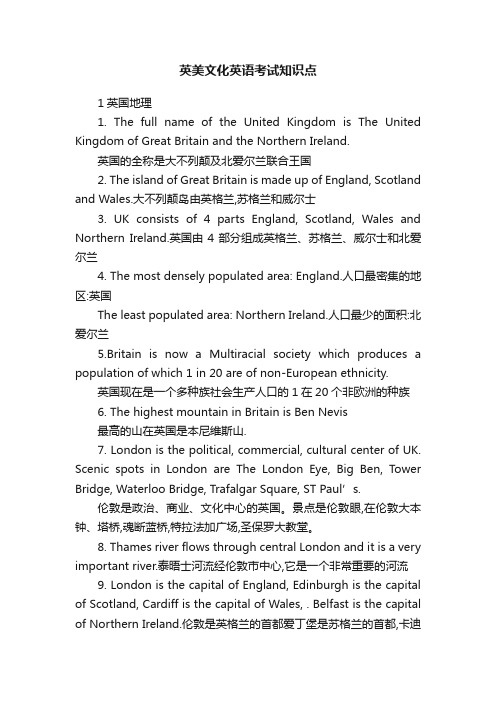
英美文化英语考试知识点1英国地理1. The full name of the United Kingdom is The United Kingdom of Great Britain and the Northern Ireland.英国的全称是大不列颠及北爱尔兰联合王国2. The island of Great Britain is made up of England, Scotland and Wales.大不列颠岛由英格兰,苏格兰和威尔士3. UK consists of 4 parts England, Scotland, Wales and Northern Ireland.英国由4部分组成英格兰、苏格兰、威尔士和北爱尔兰4. The most densely populated area: England.人口最密集的地区:英国The least populated area: Northern Ireland.人口最少的面积:北爱尔兰5.Britain is now a Multiracial society which produces a population of which 1 in 20 are of non-European ethnicity.英国现在是一个多种族社会生产人口的1在20个非欧洲的种族6. The highest mountain in Britain is Ben Nevis最高的山在英国是本尼维斯山.7. London is the political, commercial, cultural center of UK. Scenic spots in London are The London Eye, Big Ben, Tower Bridge, Waterloo Bridge, Trafalgar Square, ST Paul’s.伦敦是政治、商业、文化中心的英国。
2024秋七年级英语上册英美文化英美文化阅读素材新版人教新目标版
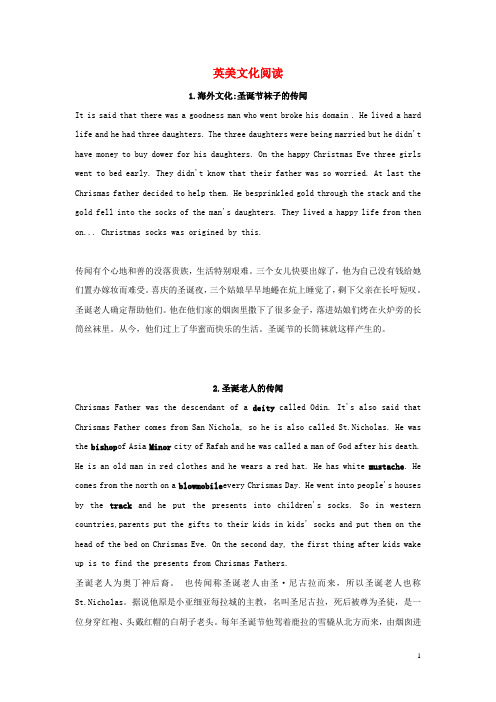
英美文化阅读1.海外文化:圣诞节袜子的传闻It is said that there was a goodness man who went broke his domain . He lived a hard life and he had three daughters. The three daughters were being married but he didn't have money to buy dower for his daughters. On the happy Christmas Eve three girls went to bed early. They didn't know that their father was so worried. At last the Chrismas father decided to help them. He besprinkled gold through the stack and the gold fell into the socks of the man's daughters. They lived a happy life from then on... Christmas socks was origined by this.传闻有个心地和善的没落贵族,生活特别艰难。
三个女儿快要出嫁了,他为自己没有钱给她们置办嫁妆而难受。
喜庆的圣诞夜,三个姑娘早早地蜷在炕上睡觉了,剩下父亲在长吁短叹。
圣诞老人确定帮助他们。
他在他们家的烟囱里撒下了很多金子,落进姑娘们烤在火炉旁的长筒丝袜里。
从今,他们过上了华蜜而快乐的生活。
圣诞节的长筒袜就这样产生的。
2.圣诞老人的传闻Chrismas Father was the descendant of a deity called Odin. It's also said that Chrismas Father comes from San Nichola, so he is also called St.Nicholas. He was the bishop of Asia Minor city of Rafah and he was called a man of God after his death. He is an old man in red clothes and he wears a red hat. He has white mustache. He comes from the north on a blowmobile every Chrismas Day. He went into people's houses by the track and he put the presents into children's socks. So in western countries,parents put the gifts to their kids in kids' socks and put them on the head of the bed on Chrismas Eve. On the second day, the first thing after kids wake up is to find the presents from Chrismas Fathers.圣诞老人为奥丁神后裔。
18秋3英上(PEP)英美人习惯(英美文化常识) 英语课外拓展
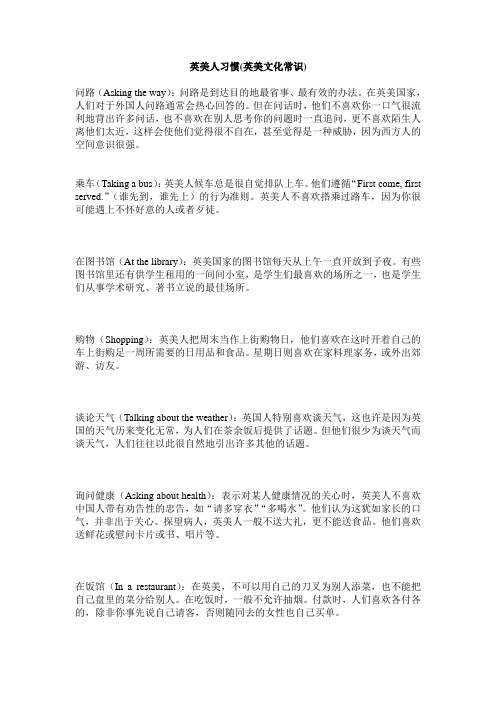
英美人习惯(英美文化常识)问路(Asking the way):问路是到达目的地最省事、最有效的办法。
在英美国家,人们对于外国人问路通常会热心回答的。
但在问话时,他们不喜欢你一口气很流利地背出许多问话,也不喜欢在别人思考你的问题时一直追问,更不喜欢陌生人离他们太近,这样会使他们觉得很不自在,甚至觉得是一种威胁,因为西方人的空间意识很强。
乘车(Taking a bus):英美人候车总是很自觉排队上车。
他们遵循“First come, first served.”(谁先到,谁先上)的行为准则。
英美人不喜欢搭乘过路车,因为你很可能遇上不怀好意的人或者歹徒。
在图书馆(At the library):英美国家的图书馆每天从上午一直开放到子夜。
有些图书馆里还有供学生租用的一间间小室,是学生们最喜欢的场所之一,也是学生们从事学术研究、著书立说的最佳场所。
购物(Shopping):英美人把周末当作上街购物日,他们喜欢在这时开着自己的车上街购足一周所需要的日用品和食品。
星期日则喜欢在家料理家务,或外出郊游、访友。
谈论天气(Talking about the weather):英国人特别喜欢谈天气,这也许是因为英国的天气历来变化无常,为人们在茶余饭后提供了话题。
但他们很少为谈天气而谈天气,人们往往以此很自然地引出许多其他的话题。
询问健康(Asking about health):表示对某人健康情况的关心时,英美人不喜欢中国人带有劝告性的忠告,如“请多穿衣”“多喝水”。
他们认为这犹如家长的口气,并非出于关心。
探望病人,英美人一般不送大礼,更不能送食品。
他们喜欢送鲜花或慰问卡片或书、唱片等。
在饭馆(In a restaurant):在英美,不可以用自己的刀叉为别人添菜,也不能把自己盘里的菜分给别人。
在吃饭时,一般不允许抽烟。
付款时,人们喜欢各付各的,除非你事先说自己请客,否则随同去的女性也自己买单。
英美文化背景知识 (英文版)
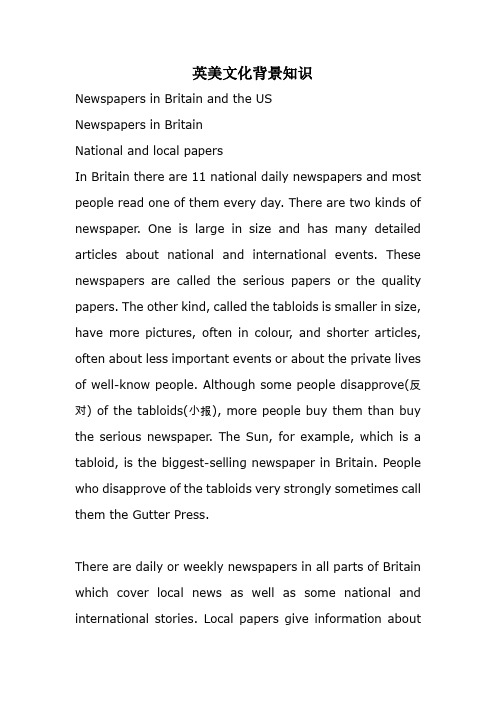
英美文化背景知识Newspapers in Britain and the USNewspapers in BritainNational and local papersIn Britain there are 11 national daily newspapers and most people read one of them every day. There are two kinds of newspaper. One is large in size and has many detailed articles about national and international events. These newspapers are called the serious papers or the quality papers. The other kind, called the tabloids is smaller in size, have more pictures, often in colour, and shorter articles, often about less important events or about the private lives of well-know people. Although some people disapprove(反对) of the tabloids(小报), more people buy them than buy the serious newspaper. The Sun, for example, which is a tabloid, is the biggest-selling newspaper in Britain. People who disapprove of the tabloids very strongly sometimes call them the Gutter Press.There are daily or weekly newspapers in all parts of Britain which cover local news as well as some national and international stories. Local papers give information aboutfilms, concerts, and other things that are happening in the local neighborhood, including, for example, information about local people who have been married or died recently. National papers generally give information about film, concerts and other events happening in London, In Scotland, many people read the Glasgow Herald or the Scotsman and there are Scottish Editions of the tabloids.There also many free local newspapers which are delivered to people’s homes whether they ask for them or not. These contain a lot of advertisements(广告) and also some news.PoliticsMost national newspapers in Britain express a political opinion and people choose the newspaper that they read according to their own political beliefs. Most of the newspapers are right-wing. These are the Daily Telegraph(serious newspaper), the Daily express, Daily Mail, Daily Star, the Sun and Today(all tabloids). Of the other serious newspapers, The Times, the oldest newspaper in Britain, did not formerly have one strong political view but itis now more right-wing. The Guardian is slightly left-wing, the Independent is centre and the Financial(金融) with political issues, but reports on business and financial news. The Daily Mirror(tabloid) is left-wing.Daily and Sunday newspapersDaily newspapers are published on every day of the week except Sunday. Sunday newspapers are larger than daily newspapers, often having 2 or 3 sections. There is also other a magazine, called the colour supplement(增刊). All the Sunday newspapers are national Serious newspapers include the Observer(which is slightly left-wing), the Sunday Times, the Sunday Telegraph and the Independent on Sunday, the Sunday Mirror, the Sunday Express, the News of the World and the Sunday Sport which is considered to lack much serious information.Newspapers in The USNational and local newspapersThere are more than 1500 daily newspapers in the US. Each one is usually sold only in one part of the country, e.g. in a city, but they cover national and international news. In larger cities there is often more than one newspaper and the different ones express different political opinions. Some newspapers are sold in nearly all parts of the US. E.g. USA today and the National edition of the New York Times. Two other newspapers, the Los Angeles Times and the Washington Post are know and respected all over the US but cannot be bought everywhere. Other important newspapers are: the Boston Globe, sold in New England, the Chicago Tribune, sold in the Midwest, the Christian Science Monitor and USA Today, both sold nationally, and the Washington Post on the East Coast.There are also weekly newspapers in all parts of the US which cover local news, such as what is happening in the local neighborhood(地方). Fewer people read these than read the daily newspapers.Daily and Sunday newspapersDaily newspapers are published on every day of the week except Sunday. Sunday newspapers are very big, often having several separate parts. They contain many longer articles and a lot of advertisements. Each section deals with a different subject. E.g. national and international news, sport, travel, etc. One section, the classifieds(分类广告) has advertisements for jobs and things for sale. Another section is called the funnies. There is often also a magazine which is in color.Alternative newspapersIn the 1960s a group of newspapers began to appear that were later called in “alternative press”. They expressed extreme(极端的) political opinions, especially left-wing opinion. Many of the newspapers which were part of this movement, such as the Village Voice in New York or the Reader in Chicago, are less extreme today and more widely read.Law in Britain and the USIn both Britain and the US, when a person is accused of a rime it must be shown that they are guilty "beyond reasonable doubt". A person is always innocent(无罪) in the eyes of the law until they have been proved to be guilty by a court they can sometimes ask for permission to APPEAL(上诉) to a higher court in the hope that it will change this decision.Criminal law in England and WalesWhen someone is arrested (ARREST) by the police, a MAGISTRATE (=an official who judges cases in some types of courts) decides whether there is enough EVIDENCE(证据) against the person for the case to go to court. If there is enough evidence and the case is a serious one, the person accused(控告) of the crime (called 'the accused(被告)') is sent to a CROWN COURT for a TRIAL with a JUDGE and JURY (=12 members of the public who have to decide if the accused is guilty(有罪的), then the judge decides the SENTENCE(判决) (2) (=punishment). If there is enough evidence against the accused but the crime is not a seriousone (for example a traffic offence) then the case is heard in a MAGISTRATES COURT.If found guilty in the Crown Court the accused may apply to(请求) the COURT OF APPEAL (Criminal Division) where he or she will be heard by a judge. Sometimes a HIGH COURT judge from the Queen's Bench Division assists in dealing with criminal matters in the Court of Appeal or Crown Court.Criminal law in Northern IrelandIn Northern Ireland, as in England and Wales, someone accused of a crime may be tried in a Magistrates' Court or a Crown Court depending on how serious the crime is. Appeals from the Crown Court are heard in the Northern Ireland Court of Appeal.Criminal law in ScotlandScotland has a separate court system. After a person is arrested by the police, an official called the PROCURATOR FISCAL is in charge of deciding whether there is enoughevidence against the accused for a trial. If there is enough evidence and the crime is a very serious one, the accused is sent to the HIGH COURT OF JUSTICIARY where there is a judge and jury(陪审团) (in Scotland there are 15 people on a jury). If there is enough evidence but the crime is a less serious one, the case is heard in a SHERIFF COURT (The sheriff is a trained lawyer who acts as a judge). Appeals from the Sheriff Court go to the High Court of Justiciary.Criminal law in the USThe US has tow separate court systems. In general terms STATE COURTS are used when someone has done something against the laws of CONSTITUTION of a particular State. FEDERAL COURTS deal with cases to do with the laws and Constitution of the United States as whole. Federal courts also hear cases where the US Government is one of the sides involved(介入). Cases for crimes which are not serious are likely to be heard in state courts. Serious crimes may be tried in wither state courts of federal courts depending on the situation, for example cases where a crime has taken place in another state are often heard in federal courts.After a person has been arrested a magistrate(地方官员), or in some cases a GRAND JURY made up of between 16 and 23 citizens, decides whether they should go to trial. If there is enough evidence for a trial the accused goes to court and has to state whether he/she is guilty or not guilty of the crime. If they say they are not guilty they are sent to trial with a judge and jury (of 16 or 20 citizens) in either a State or COUNTY COURT or, in federal cases, a DISTRICT COURT. If the accused is found guilty they may have the fight to appeal to a higher court, as shown below.The final court of appeal in the US federal system and for some cases in the state courts is the US SUPREME COURT. It is made up of a CHIEF JUSTICE and eight ASSOCIATES. The accused does not have the fight to be heard by the Supremes Court, but the Supreme Court decides which cases it will hear.Holiday in Britain and the USPaid HolidayPeople in the US get 2 weeks a year paid vacation (holiday) form their job. Most British people have four or five weeks paid holiday a year. Americans often complain that tow weeks is not enough holiday, especially when they hear about the longer holidays that Europeans get. In addition, there are 8 days in each country, which are public holidays (the British call Bank Holiday) and many of these fall on a Monday giving people a long weekend. In Britain, so many people drive to another part of the country, especially the coast, on Bank Holiday weekends that there are serious traffic jams, which may stretch(长达) for many miles.Popular Holiday PlacesWith the US, outdoor vacations are popular, for example at the Grand Canyon or Yosemite or Yellowstone or the national parks or forests. Yong people may go walking or camping in the mountains. Many people have capers or small trailer(拖车) in which to travel, or if they are in a car, they may stay at Motels on the journey Disneyland and Disneyworld are also popular and people can to skiing in the Rocky Mountains of Colorado, Wyoming and Montana.。
初中英语英美文化英美历史、地理及政治素材
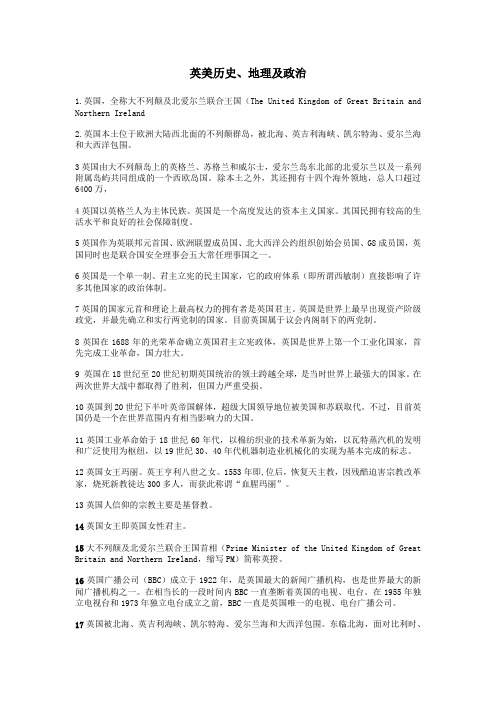
英美历史、地理及政治1.英国,全称大不列颠及北爱尔兰联合王国(The United Kingdom of Great Britain and Northern Ireland2.英国本土位于欧洲大陆西北面的不列颠群岛,被北海、英吉利海峡、凯尔特海、爱尔兰海和大西洋包围。
3英国由大不列颠岛上的英格兰、苏格兰和威尔士,爱尔兰岛东北部的北爱尔兰以及一系列附属岛屿共同组成的一个西欧岛国。
除本土之外,其还拥有十四个海外领地,总人口超过6400万,4英国以英格兰人为主体民族。
英国是一个高度发达的资本主义国家。
其国民拥有较高的生活水平和良好的社会保障制度。
5英国作为英联邦元首国、欧洲联盟成员国、北大西洋公约组织创始会员国、G8成员国,英国同时也是联合国安全理事会五大常任理事国之一。
6英国是一个单一制、君主立宪的民主国家,它的政府体系(即所谓西敏制)直接影响了许多其他国家的政治体制。
7英国的国家元首和理论上最高权力的拥有者是英国君主。
英国是世界上最早出现资产阶级政党,并最先确立和实行两党制的国家。
目前英国属于议会内阁制下的两党制。
8英国在1688年的光荣革命确立英国君主立宪政体,英国是世界上第一个工业化国家,首先完成工业革命,国力壮大。
9 英国在18世纪至20世纪初期英国统治的领土跨越全球,是当时世界上最强大的国家。
在两次世界大战中都取得了胜利,但国力严重受损。
10英国到20世纪下半叶英帝国解体,超级大国领导地位被美国和苏联取代。
不过,目前英国仍是一个在世界范围内有相当影响力的大国。
11英国工业革命始于18世纪60年代,以棉纺织业的技术革新为始,以瓦特蒸汽机的发明和广泛使用为枢纽,以19世纪30、40年代机器制造业机械化的实现为基本完成的标志。
12英国女王玛丽。
英王亨利八世之女。
1553年即,位后,恢复天主教,因残酷迫害宗教改革家,烧死新教徒达300多人,而获此称谓“血腥玛丽”。
13英国人信仰的宗教主要是基督教。
英美文化概论整理

英美文化概论整理---------------------------------------英国:1、The official name of the United Kingdom is the United Kingdom of Great Britain and Northern Ireland.2、The British Isles are made up of two large islands-Great Britain(the larger one)and Ireland,and hundreds of small ones.3、(UK)capital:London4、There are three political divisions on the island of Great Britain: England,Scotland,and Wales.England is the largest,most populous and richest.5、The British Empire(大英帝国):one fourth of the world’s people and one fourth of the world’s land area.The British Empire gradually disappeared and it was replaced by the British Commonwealth or the Commonwealth of Nations in1931.The Commonwealth is a free association of independent countries that were once colonies of Britain.6、The United Kingdom is separated from the rest of Europe by the English Channel in the south and the North Sea in the east.The English Channel lies between Britain and France.7、The highest mountain in Britain is Ben Nevis(本尼维斯山),1,343m in Scotland.The longest river is the Severn River(塞文河)(338km);the second largest and most important river is the Thames River(336km). The largest lake in Britain is the Lough Neagh(内伊湖)in Northern Ireland.8、The English are Anglo-Saxons(盎格鲁撒克逊人),but the Scots,Welsh and Irish are Celts(凯尔特人).9、Britain is an island country.It is surrounded by the sea.It lies in the north Atlantic Ocean off the north coast of Europe.10、Chunnel stands for channel and tunnel which was cut under the Straits of Dover.With it England and France join together by road.11、90%of the population is urban and only10%is rural.12、The United Kingdom is a constitutional monarchy.The monarch actually has no real power.The monarch’s power are limited by law and Parliament.Constitutional monarchy began after the Glorious Revolution in1688.Parliament consists of the Sovereign(君主),the House of Lords (上议院)and the House of Commons(下议院).13、British constitution is made up of statute law,common law and conventions.14、The festivals:Christmas,Easter,and Whit Sunday.15、The most typically English of sports is cricket(板球).感谢阅读,欢迎大家下载使用!。
初二英语国家与文化知识点
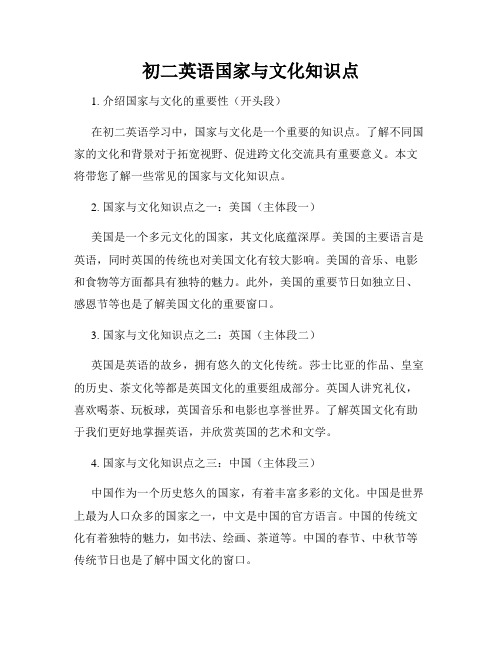
初二英语国家与文化知识点1. 介绍国家与文化的重要性(开头段)在初二英语学习中,国家与文化是一个重要的知识点。
了解不同国家的文化和背景对于拓宽视野、促进跨文化交流具有重要意义。
本文将带您了解一些常见的国家与文化知识点。
2. 国家与文化知识点之一:美国(主体段一)美国是一个多元文化的国家,其文化底蕴深厚。
美国的主要语言是英语,同时英国的传统也对美国文化有较大影响。
美国的音乐、电影和食物等方面都具有独特的魅力。
此外,美国的重要节日如独立日、感恩节等也是了解美国文化的重要窗口。
3. 国家与文化知识点之二:英国(主体段二)英国是英语的故乡,拥有悠久的文化传统。
莎士比亚的作品、皇室的历史、茶文化等都是英国文化的重要组成部分。
英国人讲究礼仪,喜欢喝茶、玩板球,英国音乐和电影也享誉世界。
了解英国文化有助于我们更好地掌握英语,并欣赏英国的艺术和文学。
4. 国家与文化知识点之三:中国(主体段三)中国作为一个历史悠久的国家,有着丰富多彩的文化。
中国是世界上最为人口众多的国家之一,中文是中国的官方语言。
中国的传统文化有着独特的魅力,如书法、绘画、茶道等。
中国的春节、中秋节等传统节日也是了解中国文化的窗口。
5. 国家与文化知识点之四:其他国家(主体段四)除了美国、英国和中国,世界上还有许多其他国家也拥有丰富的文化。
法国以其浪漫和时尚而著名,意大利以其美食和建筑而吸引人,日本以其独特的礼仪和传统艺术闻名,等等。
了解这些国家的文化不仅可以加深对其他国家的认识,也能促进跨文化交流。
6. 总结通过了解不同国家的文化,可以帮助我们更好地了解世界各地的人们,并促进文化之间的相互交流与理解。
初二英语学习中掌握国家与文化知识点,对于提高英语水平和培养跨文化意识具有重要作用。
(注:此为一篇大致满足1000字的文章,可根据需要增减字数。
文章内容仅供参考,具体内容可根据实际情况进行调整。
)。
2020秋七年级英语上册 英美文化 英美历史、地理及政治素材 (新版)人教新目标版
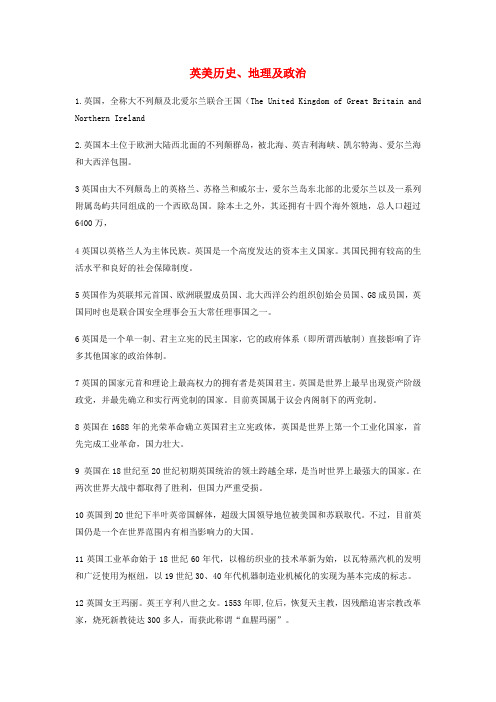
英美历史、地理及政治1.英国,全称大不列颠及北爱尔兰联合王国(The United Kingdom of Great Britain and Northern Ireland2.英国本土位于欧洲大陆西北面的不列颠群岛,被北海、英吉利海峡、凯尔特海、爱尔兰海和大西洋包围。
3英国由大不列颠岛上的英格兰、苏格兰和威尔士,爱尔兰岛东北部的北爱尔兰以及一系列附属岛屿共同组成的一个西欧岛国。
除本土之外,其还拥有十四个海外领地,总人口超过6400万,4英国以英格兰人为主体民族。
英国是一个高度发达的资本主义国家。
其国民拥有较高的生活水平和良好的社会保障制度。
5英国作为英联邦元首国、欧洲联盟成员国、北大西洋公约组织创始会员国、G8成员国,英国同时也是联合国安全理事会五大常任理事国之一。
6英国是一个单一制、君主立宪的民主国家,它的政府体系(即所谓西敏制)直接影响了许多其他国家的政治体制。
7英国的国家元首和理论上最高权力的拥有者是英国君主。
英国是世界上最早出现资产阶级政党,并最先确立和实行两党制的国家。
目前英国属于议会内阁制下的两党制。
8英国在1688年的光荣革命确立英国君主立宪政体,英国是世界上第一个工业化国家,首先完成工业革命,国力壮大。
9 英国在18世纪至20世纪初期英国统治的领土跨越全球,是当时世界上最强大的国家。
在两次世界大战中都取得了胜利,但国力严重受损。
10英国到20世纪下半叶英帝国解体,超级大国领导地位被美国和苏联取代。
不过,目前英国仍是一个在世界范围内有相当影响力的大国。
11英国工业革命始于18世纪60年代,以棉纺织业的技术革新为始,以瓦特蒸汽机的发明和广泛使用为枢纽,以19世纪30、40年代机器制造业机械化的实现为基本完成的标志。
12英国女王玛丽。
英王亨利八世之女。
1553年即,位后,恢复天主教,因残酷迫害宗教改革家,烧死新教徒达300多人,而获此称谓“血腥玛丽”。
13英国人信仰的宗教主要是基督教。
英美文化知识点整理

Chapter 11.the geographical composition of the U.K.: two/four parts2.the population: the majority / the earliest inhabitants3.the English language: the Germanic group of the Indo-European family / threeperiodsChapter 24.Westminster Abbey5.1066, Norman Conquest, feudalism6.Henry II—jury system7.Magna Carta8.the Hundred Years’ War9.House of Tudor: medieval to modern10.Religious Reformation: the Roman Catholic Church VS. Henry VIII11.two camps of the Civil War12.the Glorious Revolution, the Bill of Rights, constitutional monarchy13.the Industrial Revolution: reasons / effects14.the British Empire —colonization15.Three Majestic CirclesChapter 316.the British Constitution: three parts17.a division of powers among three branches18.Parliament —the law-making body; two housesThe House of Commons —center of parliamentary power19.the role of the Prime Minister20.The House of Lords —Supreme Court21.Scotland —a distinct legal system22.right/left wing party23.a general election —every 5 years24.The Commonwealth —decolonization; an unpolitical union of sovereign statesChapter 425.Margaret Thatcher and her controversial policies26.three sectors of economy —primary, secondary and tertiary27.the major trends in the British economy28.two pillar industries of the current British economyChapter 529.British compulsory education —5 to 1630.four stagessecondary education —comprehensive schoolfurther education —sixth form31.two systemsindependent system —public schools32.GCSE, A-levels33.Oxford University —oldestCambridge University —more Nobel Prize winners34.“Big Three” of the quality press35.Boxing Day / Easter / Trooping the Color / Bonfire NightChapter 636.the Renaissance —sonnet / dramaWilliam Shakespeare, Hamlet37.the Neo-Classical Period:Jonathan Swift —satire, Gulliver’s TravelsDaniel Defoe —progenitor of the novel in English, Robinson Crusoe38.the Romantic Periodthe Lake Poets / second generation39.the Victoria Period —novelRealism: Charles Dickens / Thomas HardyNew literary trends —Neo-Romanticism / Aestheticism40.the Modern Period:stream of consciousnessChapter 841.Stars and Stripes42.50 states (48+2) and Washington D.C.the smallest and the largest43.the Appalachian Range / Rocky mountains44.Great Lakes / Niagara Falls45.the Mississippi River46.New England47.New York (the largest city), Los Angeles (second largest), San Francisco (largestChinatown)48.population —while /blacks / asians / natives / mixed race49.a “melting pot” and a “salad bowl”50.dominant American culture / cultural diversityChapter 951.1607, James Town52.American War of Independencefirst shots / turning point / a decisive victory53.1755, Philadelphia, the Second Continental Congress54.July 4th, 1776, Thomas Jefferson, the Declaration of IndependenceIndependence Day (the national day)55.American Civil WarAbraham Lincoln, Emancipation Proclamation—abolishing slavery56.America’s policy at the first stage of WWI —neutralityAmerica’s policy at the first stage of WWII —“sit on the fence”The direct cause for America’s entrance into WWII —Pearl Harbor Attack57.Franklin D. Roosevelt —“New Deal” aimed at Great Depression58.“Truman Doctrine”—the Cold War (containment and intervention)59.the Vietnam War —Eisenhower, John F. Kennedy, Lyndon B. Johnson60.Richard M. Nixontwo diplomatic breakthroughs; the Watergate ScandalChapter 1061.the Constitution of the U. S.1787; checks and balances; the first ten amendments—Bill of Rights; 27 amendments62.federalism / the separation of powers63.Congress —the legislative branch —to pass lawsthe Senate amd the House of Representatives64.to introduce a bill —to hold hearings —to report to the Congress —to go tothe President for approval65.the President’s powers —limited66.the qualification of a candicate for President67.the Supreme Court —one Chief Justice+ eight Associate Justices68.a two-party system —a donkey and an elephant69.a general election, not a direct election / every 4 years538 electors (270 needed to win) / Electoral College System / “winner-take-all”(two exceptions)Chapter 1170.progress of the modern American economy: colonial—farming—industrial71.Wall Street —financial services industryDetroit —automobile industrySilicon Valley —high-tech industryChapter 1272.ideals of American Education73.three stages of American educational system12-year compulsory education —elementary and secondary74.Ivy League —8 top private universities with long historyHarvard University —the oldest75.The New York Times(the most influential); The Washington Post(the secondlargest & the first to expose the Watergate scandal)76.Thanksgiving ( the origin; celebration: significance)Chapter1377.the Romantic PeriodJames Fennimore Cooper —the author of the “Leather Stocking Tales”Ralph Waldo Emerson —the chief spokesman of TranscendentalismNathaniel Hawthorne —The Scarlet LetterEdgar Allan Poe —detective story / science fiction / horror fictionHerman Melville —Moby Dick/The Whaletwo founts of American poetry —Walt whitman (free verse) & Emily Dickinson 78.the Realistic PeriodMark Twain —colloquialism; the true father of American modern literature 79.the Naturalistic PeriodTheodore Dreiser —describing the sordid side of the everyday life of the lower societySister Carrie; An American Tragedy80.the Modern Periodthe Lost Generation & the Beat MovementTory Morrison —the first African-American Nobel Prize Winner。
2019秋七年级英语上册英美文化英美饮食文化素材(新版)人教新目标版

英美饮食文化1.时下所流行的下午茶也是传来自于英国,其较知名的有维多莉亚式,内容可说是包罗万象,包括各式小点、松糕、水果挞及三明治等。
2.英国的酒馆无所不在,有好几万家大大小小各具风味的酒馆,其中不乏数百年历史的. 英国人不怎么热衷口味花哨的鸡尾酒英国的酒馆也有不近人情的地方,就是严格执行打烊时间,通常是晚上十点半,下午也得中断,打烊到五六点钟才开门。
3.头盘也称开胃品,一般有冷盘和热头盘之分,常见的品种有鱼子酱、鹅肝酱、熏鲑鱼、鸡尾杯、奶油鸡酥盒、焗蜗牛。
4.英国人平时谈吐语言中,“请”与“谢谢”非常普遍,即使家庭中也是如此。
父母子女同桌吃饭时,父亲叫儿子把桌子上那瓶盐、酱油或其他东西拿过来,也得说声:“请把盐拿给我。
”当儿子把父亲所要的东西拿过来后,作父亲的一定要说声:“谢谢”。
5.在英国,一般富裕人家往往每日三餐,即早餐、午餐、茶点和晚餐。
英式早熟知是因为里面多是煎炸的食物:香肠,腌肉,蘑菇,番茄。
除此之外,还有土司,英式烤饼,茄汁焗豆等食物。
6.英式下午茶一般一两点左右开始, 通常是搭配成套,包括一壶茶及一份点心。
点心有三明治、奶油松饼或是小蛋糕。
7.鱼和薯条在英国是一个受欢迎的外卖食品,起源于1858年或1863年。
它由炸制的传统的鳕鱼或比目鱼裹着面糊面包屑,并配上炸土豆条。
8.传统的正餐通常有四道菜:第一道是汤,第二道是鱼,第三道是肉,第四道是甜点、布丁拼盘,和冰淇林,现在正餐基本上由头盘、主食和甜品组成。
9.美国人吃不同的肉类,但他们最喜欢的是牛肉。
当然,鸡肉和海鱼也是他们的美食。
如果你问美国人他们喜欢几分熟的牛排的话,答案可能会相当不同。
10.在美国很多人喜欢喝不加奶油或糖的黑咖啡。
据统计,美国人每天喝五百万杯咖啡。
当然,美国也欢迎其他饮料,如牛奶,奶昔,果汁,茶等。
11.美国人关心很多做事的速度。
大多数人吃早餐和午餐非常的快,除非它是一个社会企业或家庭聚会的场合。
但是晚饭,通常是一个时间较长的家庭聚会。
- 1、下载文档前请自行甄别文档内容的完整性,平台不提供额外的编辑、内容补充、找答案等附加服务。
- 2、"仅部分预览"的文档,不可在线预览部分如存在完整性等问题,可反馈申请退款(可完整预览的文档不适用该条件!)。
- 3、如文档侵犯您的权益,请联系客服反馈,我们会尽快为您处理(人工客服工作时间:9:00-18:30)。
About American
1.What is the full name of America?
The United States of America
2 How many states are there in the United States?
Fifty states
3 What is the capital of the USA
Washington D.C.
4 Where is the Stature of Liberty?
In New York
5 Where does the American president live ?
In the white house
About Britain
1 What does UK stand for ?
The United Kingdom
2 What us the full name of the UK?
The United Kingdom of Great Britain and Northern Ireland. 3What are the four parts of the UK?
England, Scotland, Wales, and Northern Ireland.
4In which continent is the UK situated?
In Europe.
5 By which channel is the UK separated
The English Channel
About China
1.How many ethnic groups are there in China?
56
2.In which continent is China located
In Asia
3. what are the four great inventions in ancient China? Paper-making, printing, gunpowder, and the compass
4. What is the largest island in China?
Taiwan Island
5. When was the people’s Republic of China founded?
On October 1st,1949
6. How many stars are there on the national flag of China?
Five
7 .Name three neighboring countries of China
(The answer varies. It could be any three of them) Japan, Vietnam, Russia, Cambodia, Laos, etc)
three well -known scenic spots in Beijing
(The answer varies. It could be any three of them) The Great Wall, the Summer Palace, the Imperial Palace, Tian’anmen Square, etc.
9 .Why do the Chinese people usually eat at the Mid-Autumn Festival
They celebrate the it to honor the great poet Qu Yuan
10. what do Chinese people usually eat at the Mid-Autumn Festival.
Moon cakes.
11.What is the most important traditional festival in China?
The spring Festival
12. what do the Chinese do on New Year’s Eve?
Family members get together and have a big dinner.
13. what do people eat on the Lantern Festival?
Rice dumplings
14. What animal is called “The National Treasure of China”?
The panda.。
